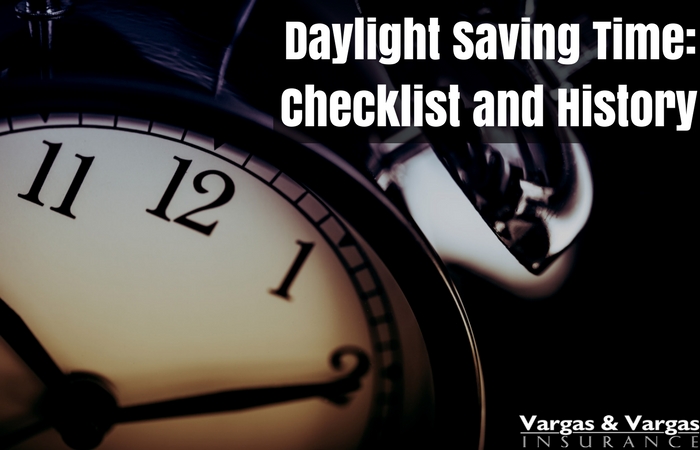
This Sunday, March 11, is the beginning of Daylight Saving Time. This means that before you go to bed on Saturday, you should turn your clocks forward one hour, since the 2am – 3am hour on Sunday will be skipped in order to shift the daylight hours into the evening for the Spring and Summer months. It will stay this way until Sunday November 4, 2018 when the 2am hour will be repeated in order to shift daylight earlier once more.
The History of Daylight Saving Time
Twice a year, we change our clocks – Spring Forward and Fall Back, just like we were taught as young kids. Have you ever wondered why this bizarre ritual exists? It turns out that the practice was officially started in World War I in an effort to conserve fuel for the war effort – first in Germany, then in the rest of Europe. The US adopted the practice in 1918 and abandoned it shortly after. During the Energy Crisis, however, the practice was brought back for good. The Emergency Daylight Saving Time Energy Conservation Act was signed by President Nixon in 1973 in order to make the bi-annual shift permanent.
Internationally, only about 40 percent of the world’s countries observe the time change. There are even some states that don’t change their clocks, including Arizona and Hawaii. Overseas territories like American Samoa, Guam, Puerto Rico, and the US Virgin Islands have also opted out of participating in DST.
Fun Facts about DST
- In 2007, it was extended. Now summer hours last about a month longer. This is at least in part so that the clocks move back in the fall after Halloween, allowing children to trick-or-treat in more daylight. This was proposed by (who else?) the candy industry.
- There is also a thought that pushing the end of DST to the first Sunday in November will increase voter turnout in elections, since Election Day will now sometimes be during “Summer Hours,” and people could stop to vote on their way home from work while there is still daylight.
- Although originally enacted in order to save energy, there have been studies that show that little to no energy is actually saved when the clocks shift to Daylight Saving Time.
- Pay attention to how you write times when you schedule meetings: during the winter, we are in “Standard Time” and during the summer we switch to “Daylight Time.” This means that here in Massachusetts (and along the east coast) we are switching from EST to EDT.
- Think about those born at the end of DST: in the Fall, the first of a set of twins or multiples could be born prior to 2am, but since the hour is repeated, those born later could have an earlier time on their birth certificate than their “older” siblings.
Chores for Your DST “To-Do” List
The changing of the clocks forward and back is a perfect reminder to perform other bi-annual household chores. So, think about giving yourself a “Daylight Saving Time” checklist, including the following tasks:
The first thing on the DST checklist is obvious: at Daylight Saving Time, you need to change the clocks! In the Spring, the clocks move forward one hour, and in the Fall, they move back an hour. Your cell phone and other electronics will change automatically, but alarm clocks and the time on appliances will likely need to be changed by hand.
Something else that you need to do twice a year is to test and change the batteries in your smoke alarms. It is critical to the safety of your loved ones that these items work properly, so it is recommended to test the batteries at least twice a year so that you’re warned if there is a fire in the house. Also change the batteries in your carbon monoxide detectors and security system, if needed.
There are several items in your home that deserve a bi-annual cleaning. This will vary according to your personal preferences, but often includes carpets and rugs (including under heavy furniture), windows and window treatments, shower curtains and liners, ceiling fans, and a complete cleaning out of the pantry and fridge. And don’t forget to flip or turn your mattress regularly to improve its longevity and your comfort.
Do you have an emergency kit in your home? You should, after all, you never know when you may end up needing it. Take the opportunity to update and restock your emergency kit when you change your clocks. Your emergency kit should include many items, including at least three gallons of water per person in your home, a three day supply of non-perishable food, medications, important documents (like copies of your insurance policies) and a flashlight with fresh batteries. See the entire list of recommendations at Ready.gov.
Remember that you should also schedule a regular meeting with your local independent insurance agent. Whether you do it as a part of your DST checklist, at the beginning of the year, as a part of your Spring Cleaning, or even on your Birthday, it’s a good way to check in on your insurance policies and to make sure that you and your loved ones have enough coverage.
To schedule a meeting with a Vargas and Vargas Insurance agent, just call 617-298-0655 today. We will be happy to review your Massachusetts home insurance, auto insurance, life insurance, and more! It only takes a few minutes to review your insurance policies, so don’t wait – call today.












